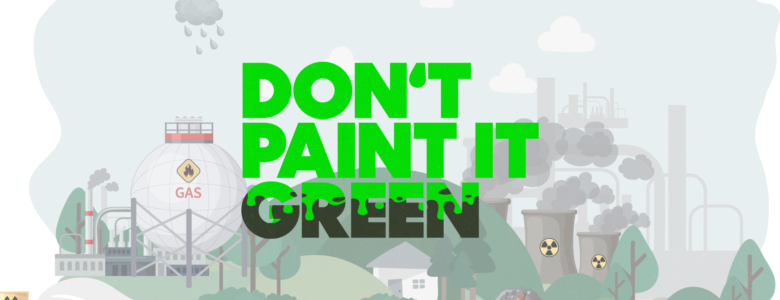
Don’t Paint it Green: DiEM25 launches campaign against the EU’s destructive energy taxonomy
With DiEM25 having taken the stance that nuclear energy is not ‘green’ after a members’ vote, it’s now time to campaign against the greenwashing of gas and nuclear.
DiEM25 has launched ‘Don’t Paint It Green’, a campaign against the greenwashing of gas and nuclear that will pressure Members of the European Parliament until they commit to stopping an energy taxonomy labelling nuclear energy and gas as ‘sustainable’.
While the world focuses its collective attention on war, the European Union is sneakily introducing a taxonomy labelling nuclear and gas as ‘sustainable’. We are going to stand up to that. Nuclear energy is a starting point for destructive nuclear weapons, and gas is a harmful fossil fuel.
Are you bothered that your country is dependent on Russian gas? Then you should be bothered by it being dependent on any gas. Corporations are lobbying the EU for more money and more infrastructure for these energy sources as we speak. We need renewable energy, not these things that they try to pass as green.
Nuclear energy is unreliable, expensive, dangerous and slow to install. And gas is finite, destructive, and contributes to the problem that the European Commission claims to want to solve. Let’s be clear: they can’t neither serve the green transition, nor be ultimate solutions to our crisis.
DiEM25 co-founder Yanis Varoufakis commented on the EU’s hypocrisy over its energy policy.
“The re-classification of gas and nuclear as ‘green’ is a sad reminder of the cartel-like architecture of the European Union. Behind the façade of a union of democracies lies a union of Big Business. Behind the myth of a Europe of peoples lies the Franco-German axis that pushed for a sordid quid-pro-quo: Paris agreed to green-wash the Russian gas on which German industry runs. And Berlin agreed to greenwash the French nuclear power industry. Hypocrisy thy name is EU green energy policy.”
Experts and people across Europe who oppose this destructive taxonomy all depend on politicians to stop it in its tracks.
However, you are not powerless and we are calling on you to make a loud and powerful statement by emailing your MP, signing a petition, and tweeting at Ursula von der Leyen that you don’t want this.
But that’s not all: We’d like you to join us on streets across Europe and/or digital spaces to help us spread the message and stop them from painting it green! Our planet is counting on all of us. So, join DiEM25 to get organized!
Please, help us build this campaign by taking part in our actions, and donate if you can.
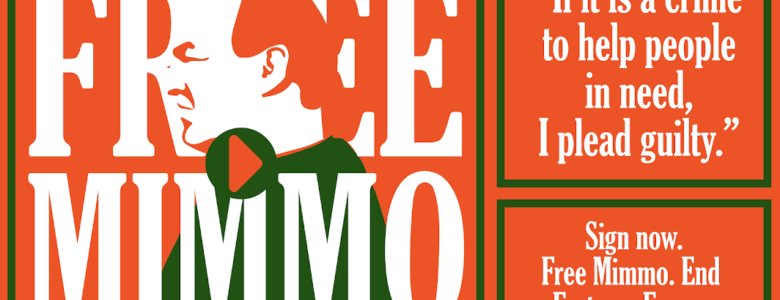
Free Mimmo: Charges against Italian mayor for supporting refugees must be dropped
DiEM25 stands in solidarity with the former mayor of Riace, Mimmo Lucano, who is facing 13 years in prison for helping refugees
DiEM25 is calling for the charges against Domenico ‘Mimmo’ Lucano to be dropped, with the former mayor of Riace, Italy, facing a 13-year prison sentence for assisting and welcoming refugees to his town.
Lucano was the mayor of Riace from 2004 to 2018, where he gained global acclaim for resettling hundreds of migrant families and revitalising the dwindling town.
His efforts saw him named runner-up in the 2010 World Mayor competition, while also featuring in Fortune’s 2016 list of greatest world leaders as well as being awarded the Dresden Peace Prize.
However, in 2018, Lucano found himself the target of far-right politician Matteo Salvini, who became interior minister.
Salvini placed Lucano under house arrest and accused him of “colonising Italy with migrants” before the courts handed ‘Mimmo’ a shocking 13-year prison sentence in September of last year.
Lucano is not going down without a fight and nor is he alone, with DiEM25 firmly supporting him in his struggle for justice.
DiEM25 co-founder Yanis Varoufakis condemned the treatment that Lucano is facing and pointed out the hypocrisy of the sentence.
“Our television screens are full of sad pictures of refugees fleeing from the war zone in Ukraine and being welcomed in the rest of Europe. The way we treat refugees is indicative of our humanity,” Varoufakis said.
“Mimmo Lucano is being dragged through the courts and fined ridiculous sums of money for doing that which we celebrate when it comes to Ukrainians. Double standards are the poison of the soul.”
Joining the alliance in support of Lucano alongside DiEM25 is the Progressive International, who released a statement calling for his release.
“We believe that the Riace model is an inspiration for the world. When our governments built fortresses to keep migrants out, you welcomed them in,” the statement reads.
“When local criminals and global corporations conspired to exploit their lack of legal protections, you built a global village and a Città Futura – a city of the future – where all residents could learn trades and find shelter.
“We are unequivocal: Your 13-year sentence is both a travesty of justice and a blatant violation of the common principles of freedom, democracy, equality, peace and stability that the European Union claims to uphold.”
Help our cause
We are counting on public support to apply pressure on the Italian government to drop the charges against Mimmo Lucano and the 26 others indicted in his case.
Join the likes of Noam Chomsky and Ada Colau in calling for an end to the case against the former Riace mayor, via the link here.
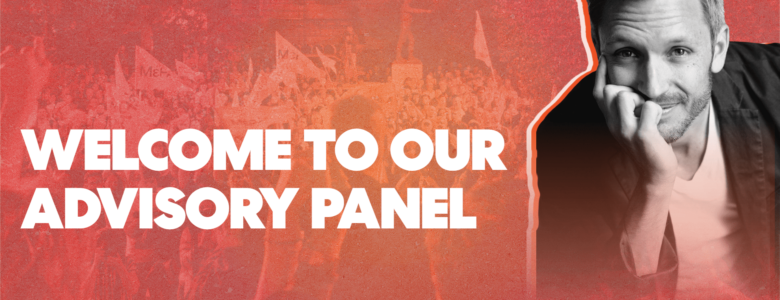
Jason Hickel joins the DiEM25 advisory panel
We’re delighted to announce Jason Hickel as the latest addition to our Advisory Panel (AP), the team which advises DiEM25 and facilitates the implementation of its aims.
Jason is an economic anthropologist whose research focuses on global inequality and political ecology. He is a Professor at the Institute for Environmental Science and Technology at the Autonomous University of Barcelona, a Visiting Senior Fellow at the International Inequalities Institute at the London School of Economics, and a Fellow of the Royal Society of Arts.
He is no stranger to DiEM25 initiatives, having previously contributed to our Green New Deal policy and our Blueprint for Europe’s Just Transition paper, where he provided important insights on the environmental policies and degrowth approach towards EU’s economy. He was also an guest speaker on our Alternative Climate Conference COP OFF, in a session about ‘Measuring and powering progress: Shattering paradigms of growth’.
Jason has argued that high-income nations do not need economic growth in order to achieve social goals; they can reduce excess resource and energy use while at the same time improving human wellbeing, by distributing income more fairly, expanding universal public goods, shortening the working week, and introducing a public job guarantee. He also writes on global development and political economy, and has contributed to The Guardian, Foreign Policy and Al Jazeera, as well as Jacobin and other media outlets.
The 38-strong Advisory Panel includes two-time Palme d’Or film director Ken Loach, UK Shadow Chancellor John McDonnell, renowned philosopher Slavoj Žižek and award-winning journalist, writer, film-maker and activist Naomi Klein. See full line-up here.
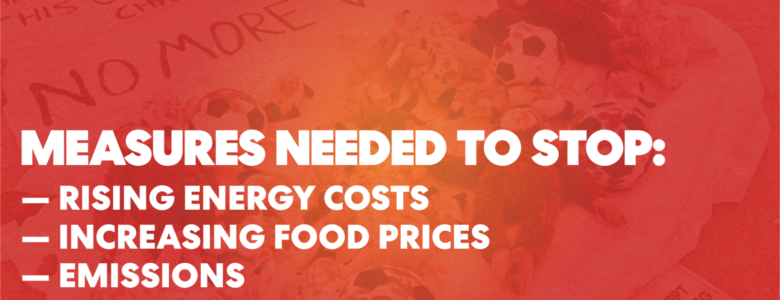
End the pointless war
Realistic measures must be implemented immediately
The impact of the tragic and unnecessary war in Ukraine is being increasingly felt on the poor and precarious. With double digit energy and food price increases – and a high likelihood of shortage in basic foods – we are heading towards global calamity. While international systems of cooperation are failing, our ‘leaders’ are talking war. Instead of focusing on the health and wellbeing of their residents, our ‘governments’ are shipping arms. The lack of resources for teachers, nurses and essential workers continues while funds suddenly appear for guns.
Our democracies have essentially failed. Militaristic decisions are no longer subject to parliamentary approval and no deliberation is needed when gambling with lives. What is essential for life is left at the door while the red carpet is rolled out for bureaucracy-free defence spending.
At DiEM25 we say: No more. And we have been calling for a just transition with our Green New Deal for Europe that realigns political priorities towards people – not profit. Our plan begins by calling for a bottom-up approach to local decision making – a critical first step to bring power back to the population. Decisions that affect the future of people must be made by them. Not by tax-haven domiciled shell companies.
Rising energy costs did not need to take place under our programme. If implemented, our policies on housing not only reduce the financial burden for roofs over our heads, but drastically reduce heating and cooling costs and related emissions. We further propose an energy allowance to eliminate energy poverty for millions of people. Further reducing costs for our families is the step to make public transport free through our Mobility Cohesion Fund. Recognising the extreme polluting and destabilising cost of wars, we further call for an International Convention for the Elimination of War Industry and put our scarce resources to reverse the climate catastrophe.
These programmes can be implemented today only if there is sufficient political will. If there is readiness to spill more blood, then the reluctance to warm our homes, reduce our greenhouse gas emissions and lower our costs of living becomes an open secret.
We invite the public to study our Green New Deal for Europe and get involved in realising it. It is only through concerted efforts by and for the public that our personal and communal liberty can be achieved.
This article was authored by Amir Kiyaei who is a member of the Peace and International Policy Thematic Collective
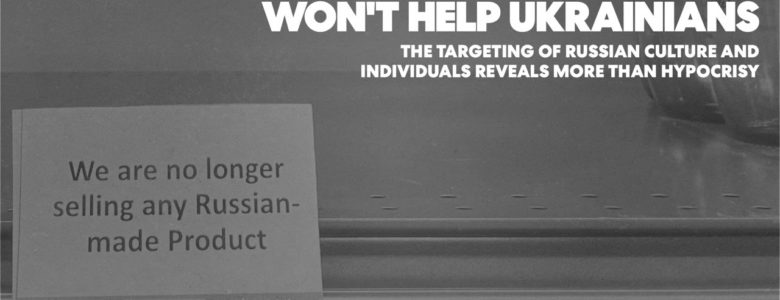
Russophobia at home won’t help Ukrainians
The targeting of Russian culture and individuals reveals more than hypocrisy
“War is so unjust and ugly that all who wage it must try to stifle the voice of conscience within themselves,” wrote Leo Tolstoy in his diary in the winter of 1853.
Last week, 169 winters later, Netflix announced it was putting its TV adaptation of Tolstoy’s classic Anna Karenina on hold in the wake of Vladimir Putin’s brutal invasion of Ukraine. Despite a life of principled pacifism, Tolstoy had made the unforgivable mistake of being Russian.
Other long-dead artists and intellectuals have been similarly punished. The Cardiff Philharmonic Orchestra removed one of Pyotr Ilyich Tchaikovsky’s works from a program. A course on Fyodor Dostoyevsky was cancelled at the University of Milano-Bicocca (the school later backtracked). Most confusingly, a statue of the German Friedrich Engels became the centre of controversy in Manchester. Unfortunately, however, the Russophobia frenzy has reserved most of its ire to the living.
Russian films have been pulled from festivals. Eurovision banned Russian acts. Russian musicians have had their concerts cancelled, despite opposing the invasion. Even Russian cats have been told they’re no longer welcome in competitions.
Some of these measures have been justified by supposed ties between individuals and the Kremlin – but even then, reality is murkier than it appears at first. The Glasgow Film Festival explained their decision to ban two Russian films from being shown by pointing to the fact that they had received funding from the Russian Ministry of Culture. But other productions funded by public money, such as Andrey Zvyagintsev’s Leviathan, are deeply critical of Russian society and the Russian establishment. Leviathan was released in 2014 to general acclaim and received multiple awards in the Western festival circuit.
More disturbing than this, though, are the numerous reports of less-visible discrimination in Europe since the start of the war. People have been targeted on streets and in public transport, and children have been beaten and humiliated at school. A molotov cocktail was thrown through the entrance of a German-Russian school in Berlin.
Some elements in society seem to have picked up the message currently being sent by their institutions and decided to add a more straightforward twist to it. Largely condemned by commentators and the general public (when reported and acknowledged), these attacks are nevertheless the natural consequence of the climate being created. Once the threshold of discrimination has been crossed, it’s difficult to retrace one’s steps.
Xenophobia will not help stop the senseless loss of innocent lives in Ukraine. Just as we stand with the Ukrainian people in their fight for their land, we must speak out against these knee-jerk reactions, which represent the opposite of what the West claims to stand for. They do nothing but fuel the Kremlin’s propagandistic claims that the West is, at the end of the day, simply against all things Russian – a bunch of moralists who shake their heads at Russian society for their prejudices and supposed taste for authoritarianism, only to jump at the first opportunity to persecute people based on their nationality and cultural background, if the collective mood allows them to do so with impunity.
But the current wave of xenophobia reveals more than simple hypocrisy. The West, as the American scholar on Russia, Stephen Kotkin, recently argued, is not a place on the map, but “a series of institutions and values” which, in Kotkin’s view, includes the rule of law, democracy, respect for the individual, diversity and pluralism of opinion. By attacking people for the mere fact that they hold a Russian passport, taking measures that hit common Russians the hardest and banning Russian media, we reveal a worldview that is, ultimately, not defined by these values at all. It’s a worldview that’s shaped by conflict, but not a conflict in which we define allies and enemies according to ethics, class, or political struggles – instead, it’s one that separates sides along the lines of race, ethnicity and language.
There are names for such a worldview. Those in need of a refresher would do well to look them up.
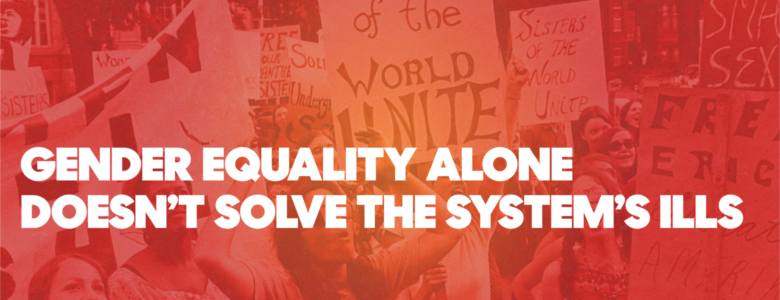
Women in politics: Gender equality alone doesn’t solve the system’s ills
Is the mere presence of women in politics automatically a victory for gender equality, or it a form of ‘gender-washing’ which covers over the more pressing need for feminine qualities to be encouraged in the political sphere?
The case for equality in politics remains a necessary one, but focusing merely on gender doesn’t address the core problems of the current system’s ills.
Installing females into positions of power is often heralded as a ‘win’ in this struggle, but what we see is often a form of ‘gender-washing’ where the balance of women and men becomes more equal yet the prevailing attitudes of said appointees rarely vary.
Was Margaret Thatcher or Angela Merkel any more ‘feminine’ than their male counterparts? DiEM25’s Ivana Nenadovic, speaking during our recent ‘Not Just Another International Women’s Day’ discussion, feels that more needs to be done to combat the absence of feminine energy, not just females, in politics if real structural change is to be seen.
“DiEM should show how politics, which is normally restricted reserved for men, could also be an inviting environment for women as well, and I guess that this panel also proves that,” Ivana said.
“I’d say that it’s a matter of energy – feminine and masculine. Both need to exist, it’s just a matter of balance.
“Something I try to emphasise is that empathy and emotions, which are all usually connected with women are, in politics, not welcome. Because politics are supposed to be this strict, professional and emotionless business so when we see women in politics we see them being basically worse than men.”
The appointment of female politicians is rightly celebrated for the progress that it signifies, although Ivana stressed that the bigger goal in this regard should be breaking down the current power structure.
“The point is not to take the power out of the hands of men and put it in the hands of women, it’s about deconstructing this power.”
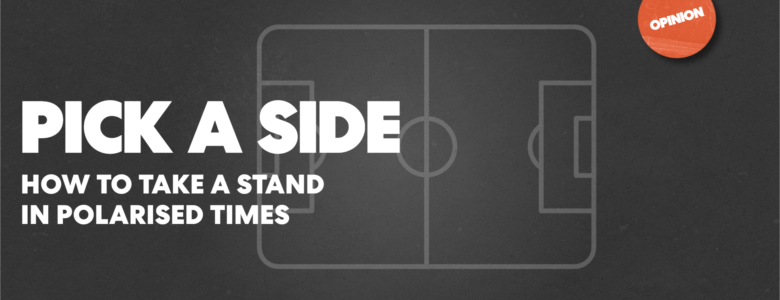
Pick a side: How to take a stand in polarised times
Damned if you do, damned if you don’t. Mehran Khalili discusses the almost impossible task of pleasing everyone in the midst of major global talking points.
Soon after Russia invaded Ukraine, DiEM25 published its position on the conflict. The sub-headline was: ‘Stop Putin’s invasion. Stop NATO escalation. Peace via a people’s diplomacy!’
On the surface, this was an uncontroversial view: end the damn war, work for peace. I’m an adviser to DiEM25, and it made sense to me.
The reaction to the statement, though, was surprising. Many people felt it stopped short of a full-on condemnation of Vladimir Putin’s actions. And they were upset. Some members and partners even quit the movement in disgust.
A few days later I hosted a debate on Ukraine, with DiEM25. We heard from a Ukraine expert, activists from Moscow and Kyiv, and a panel of commentators.
The debate was valuable, and I learned a lot. But though it was generally well received, a chunk of the reaction went the other way. Why weren’t we blaming the West, commenters asked, focusing our ire on NATO’s expansion policy that led us to this war?
OK, we can’t persuade – or please – everyone. And maybe I shouldn’t have dipped into the comments in these instances. But the reactions also showed something that’s worth looking closer at.
Whose team are you on?
Humans have an inherent need to pick a side in any dispute. And this is particularly true in times of war.
When conflict explodes, our first thoughts should of course be with the victims. As of writing, 19 children have been killed in Ukraine, among hundreds of civilians.
But for the rest of us, who are fortunate – for now – to be bystanders, our world is thrown into uncertainty. Unlike wars past, today we witness the effects of organised killing in action, brought to us in real-time and unfiltered via smartphones and social media. We grope for an understanding. And a key part of this is choosing who is wrong and right.
Our biases running wild
Yet quickly, our biases come into play. I’ll use myself as an example.
Like many others, I wasn’t following the situation in Ukraine closely until last week, when the invasion escalated everything. Friends and family asked me what was going on, and whose fault all this was. And I came up short.
War is a catastrophe. Putin was the aggressor here, brutalising and murdering the people of Ukraine. He must be condemned without reservation. And the West’s slow advance towards encircling Russia, via NATO, was a provocative act. It was a complicated, tragic mess.
So I sifted through news sources, reading as widely as I could. And while doing so, I noticed something interesting: I was looking for stories that blamed US imperialism.
Why? Our personal experience plays a greater role here than we’d like to think. The first global event that really politicised me was the Iraq war in 2003. Since then, I’ve followed US politics and foreign policy closely – and I didn’t like what I learned. And I’m half-Iranian, so I’m familiar with the effects of US intervention and how it can screw a country over.
With only basic knowledge of the facts on Ukraine, I instinctively wanted to join the tribe against US foreign policy. It was my confirmation bias in action.
Many Western observers, also scrambling for answers on the conflict after the first bombs dropped, must have come at the problem from the other direction. English-speaking legacy media, driven by the US, have been positioning Russia as the antagonist since forever.
But when Trump emerged, starting with the claim that Russia hacked the US election, this kind of coverage shifted into overdrive. It created the narrative Russia = bad, and Putin = strongman dictator (while casting the US/Biden in the opposite roles).
And when that strongman invades, thanks to confirmation bias, people imbued with this narrative are going to seek to confirm it.
It depends on when we start the clock
This video by Russell Brand provides a useful model to approach the debate on Ukraine.
Brand weighs up two articles. One adopting the view that Putin is Hitler; the other condemning him for the invasion but looking at the West’s role in the conflict in recent decades. (These views are roughly the two poles of accepted Western discourse.)
Brand cites Phyllis Bennis, who writes on Ukraine:
Resolving the conflict [..] requires understanding its causes — which has everything to do with when we start the clock.
If we start the clock in February 2022, the main problem is Russia’s attack on Ukraine. If we start the clock in 1997, however, the main problem is Washington pushing NATO [..] to expand east, breaking an assurance the U.S. made to Russia after the Cold War.
What a fantastic framing for figuring out how to apportion blame, who to support. When do you start the clock? Since violence begets violence, and illiberalism begets illiberalism… who struck out first?
We could apply this framing to any geopolitical conflict, past or present. Think Israel/Palestine, Northern Ireland, Cyprus or Taiwan.
Or take our current culture wars. Should we start the clock when the historic injustices began against a given marginalised group? Or when members of that group rose up and over-corrected, demanding, say, censorship of views they disliked?
Nuance doesn’t persuade
But the world is complex. And despite being a human need, picking a side feels like a lazy and unsatisfying way of looking at modern conflict. Why can’t we keep two thoughts in our heads at the same time, and say the blame for today’s war in Ukraine is shared between Putin and the foundation laid by US foreign policy?
In a vacuum, this makes perfect sense. And it’s what DiEM25 was trying to do with its position on Ukraine. But the nuanced take doesn’t play well with mainstream audiences today.
Sixty percent of the world’s population is on social media, spending an average of two-and-a-half hours a day. This is an ADHD-world, replete with quick takes, fed by news in the form of headlines, thumbnails, snippets, from a collapsing industry desperate for clicks. Nuance? Ain’t nobody got time for that.
In this environment, simple, bold statements, delivered with authenticity, get the most play and engagement. Especially when war breaks out, and people are feeling angry, confused, insecure.
Stop trying to explain shit, they say. People are dying here. All that’s appropriate is solidarity with the victims, and vitriol for those who dropped the bombs.
And at that moment, it’s understandable.
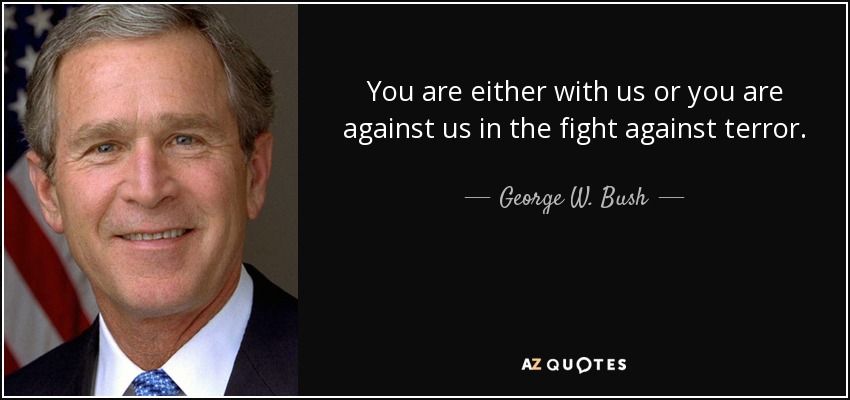
George W. Bush drew stark lines after September 11.
A framework for getting through it all
How can we navigate this landscape, when our goal is to persuade? How can we confront power and tell the full story, without doing its dirty work and amplifying its message?
There’s no easy answer. But here’s where I’m at so far: a framework you can use, whenever conflict arises, to think clearly and communicate effectively.
(Remember we need to focus on what we can influence. So the below assumes that your activist project involves working on that conflict.)
Use probabilistic thinking
Don’t deal in absolutes. Do your reading, figure out where you stand and assign probabilities to your beliefs. For example, you might think Putin is 75 percent to blame for this war, and the West 25 percent. Or the other way around. And as above, be aware of when you’re starting the clock.
It might sound odd to you. But this is a more natural reflection of how people actually think, made explicit. And it will help you keep track of how your beliefs evolve.
Because you should also…
Update your priors
Change those probabilities based on observed evidence. NYT explains:
In stats lingo, “priors” are your prior knowledge and beliefs, inevitably fuzzy and uncertain, before seeing evidence. Evidence prompts an updating; and then more evidence prompts further updating, so forth and so on. This iterative process hones greater certainty and generates a coherent accumulation of knowledge.
See systems, not people
When I wrote about what we could learn from online public shaming, I concluded that personifying your target is a good strategy.
It’s easier for people to get mad at another person than at an organisation, or a system, or an idea.
All the spittle-laden op-eds about how Putin is a demonic megalomaniac who is hell-bent on restoring Russia to its former glory are following this model.
But here you’re trying to assess a conflict, to deconstruct it and understand how you could influence it. Rather than persuade others of your view on it.
So do the reverse. Look less at the aggressor’s character and their public statements, and instead analyse the system, the machinery, that keeps them in power. In Putin’s case that means: the oligarchic class he serves, the economics and culture of Russia today, and how political decisions are taken. As well as Putin’s rise to power (largely supported by the West).
Choose your battles
In your statements, consider the audience and the goal of the exchange. If you want to persuade, do all you can to avoid triggering an emotional reaction in your audience that will cause them to oppose you from the outset.
Timing is everything. In the immediate aftermath of war breaking out, or a racist attack, or any other moment when the pain is still raw, there’s only one thing to do. Denounce the aggressor and support the victims.
There will be a time and place for your nuanced, systems-based, constructive take. But choose them wisely if you want people to listen.
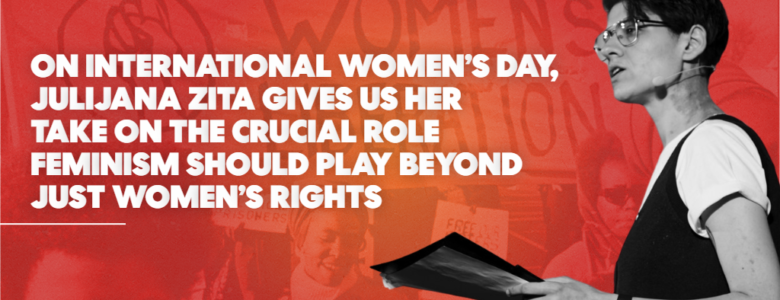
Feminists of the world, unite!
On International Women’s Day, DiEM25’s Julijana Zita gives us her take on the crucial role feminism should play beyond just women’s rights.
More than ever, feminism needs to be a political safe haven for marginalised groups, where rights are equal across the board. Fighting for equal rights, especially gender rights, is the foundation of feminism, but in the face of these tumultuous times, its goals and ambition must go beyond that.
The planet is in urgent need of taking a leap forward. While the public remains caught up in geopolitical chattering, the feminist in all of us must remain focused on peace and the prevention of any war.
It’s the voice of the feminist that should intervene and remind everyone of compassion and justice, without compromise. Furthermore, it is the whole system on which feminists should cast a cynical eye.
Beyond our daily fight against the patriarchal structures, exploitation, discrimination, oppression, austerity and wars should be our biggest enemies, as well. These are not just the roots of people‘s – especially women’s – suffering worldwide, but also parts of ideologies that we must unmask for what they are, a harm to life itself.
Feminists cannot stop at their own liberation anymore. Almost all people and all animals need liberation from the shackles of boundless capitalism and an elitist system. In order to build a world that is peaceful and just for all individuals, we all need to be united to overcome our common struggles.
It is always good to see, when people have an open heart towards any group that is in a critical situation, but there are so many groups who don’t receive any solidarity. Who, if not feminists, should have empathy with all of the powerless souls in need of so many basic things?
Many in the so-called ‘Western world’ seem to not even care about their own destiny, as long as life treats them well in the present and, unfortunately, that arrogance will only continue to hurt others.
In the 21st century, feminism should be a fundamental part of any movement or party with an honest concern about people’s struggles. Feminists should not just be something we call ourselves, but should express what morals and ethics on which we base our decisions.
If all feminists unite and demand a clean world, where the standards of living are high for everyone and not just for the few, a utopic vision could come become reality.
Even more so during such difficult times, it is crucial to aspire for peace, freedom, prosperity and equality to everyone. Happy International Women’s Day!

Our team in Berlin made this creative protest action against war in Ukraine – here’s how you can do the same
Activists from DiEM25 and MERA25 sent out a sobering message in front of the Russian embassy in Berlin on Monday, with toys representing each loss of a child’s life throughout the current war in Ukraine.
“These could have been your children’s toys,” read the message, along with teddy bears, dolls and other toys covered in (fake) blood to highlight the senseless loss of life as a result of the war.
Even more striking was the fact that our 24 toys used for the installation were already out-dated by midday on Monday, as the death toll of children had risen to 38.
Unfortunately, the number of children perishing will rise and many more toys will be soaked in blood – real blood – if Russian president Vladimir Putin doesn’t stop the war promptly.
We have to confront the Russian government with the consequences of their terror and we’re calling on you to amplify the message.
We need you!
Please join us and do the same in your local Russian embassy, wherever you’re based! It’s a small, symbolic step but together we can try to make a difference. Our DiEM25 comms team will amplify any and all installations of this kind made by DiEMers.
In this forum thread we explain how to do it and share photos.
Sign our petition
We strongly condemn Putin’s invasion of Ukraine and continue to call for an immediate ceasefire, withdrawal of troops back to the Russian Federation and solidarity for the defenders of Ukraine’s sovereignty. If you’re with us, take a few seconds to sign our petition.